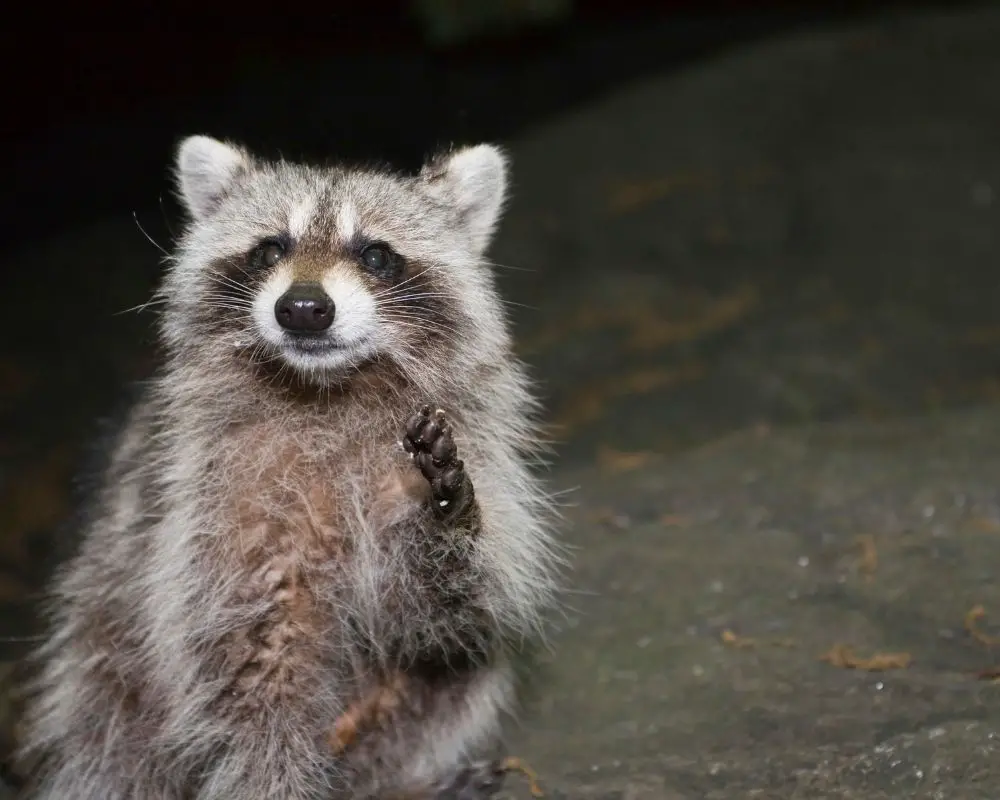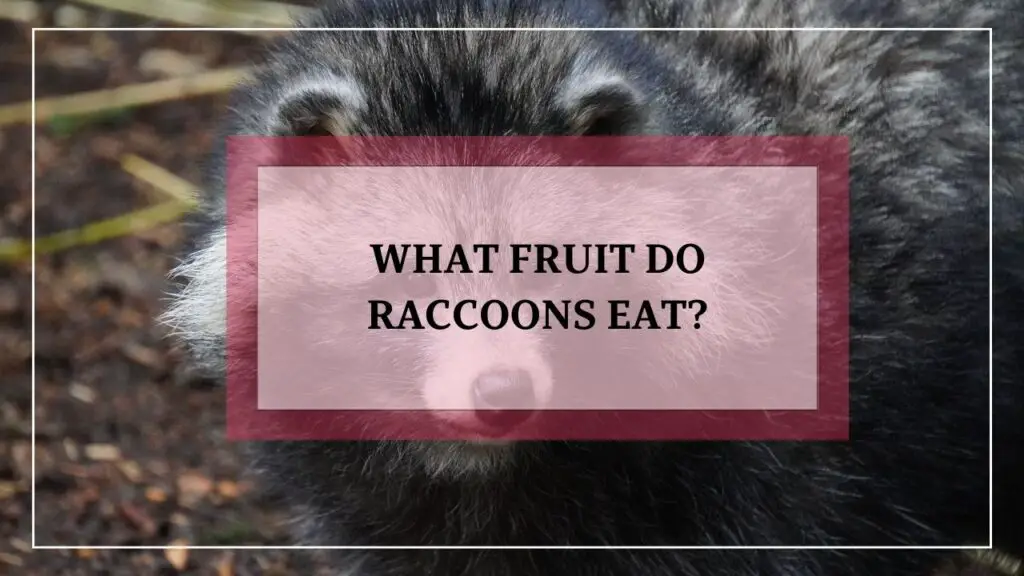Raccoons are omnivorous mammals native to North America. They have a varied diet that includes fruits, vegetables, nuts, insects, fish, and small animals. In urban and suburban areas, they are known to raid garbage cans and bird feeders for food. Raccoons are opportunistic feeders and will eat whatever is available to them.
They are particularly fond of fruits such as apples, berries, and melons. In the wild, they will also eat nuts, acorns, and other tree-borne fruits. Overall, raccoons are adaptable creatures that can thrive on a wide range of foods and can be found in a variety of environments.
In this article, we will explore the types of fruit that raccoons can eat and the potential benefits and drawbacks of providing these fruits to raccoons in the wild or as part of a diet for domesticated raccoons.
What Fruit Do Raccoons Eat?

Here are 9 fruit types that we think most raccoons love to eat:
- Apples
- Berries (such as blackberries, raspberries, and strawberries)
- Grapes
- Melons
- Peaches
- Pears
- Plums
- Persimmons
- Tomatoes
Now, like always, let’s jump into the details:
1. Apples
hey are attracted to the sweet taste of apples and will often raid orchards or backyard gardens to feast on them. Raccoons can climb trees and can also forage fallen apples on the ground.
Apples can provide a variety of nutritional benefits to raccoons. They are a good source of carbohydrates, which provide the raccoons with energy. They also contain small amounts of protein, fat, and essential vitamins and minerals such as vitamin C, potassium, and fiber. Apples also contain antioxidants, which can help protect the raccoons from diseases and help to improve their overall health. Eating apples can also help to keep raccoons hydrated as they contain a high water content.
However, it’s important to note that raccoons are omnivores and their diet should include different types of food, not only fruits. Eating a varied diet that includes fruits will provide the raccoons with a balance of essential nutrients they need to survive.
2. Berries (Such As Blackberries, Raspberries, And Strawberries)
Berries play an important role in the diet of raccoons. They are a natural food source that provides raccoons with important nutrients such as vitamins, minerals, and antioxidants. Berries are also a good source of energy, which is essential for raccoons to survive and thrive in the wild.
Berries can be found in abundance in the wild, especially during the summer and fall months, making them a reliable and readily available food source for raccoons. They forage for berries, climb trees and bushes to reach the fruits, or forage on the ground.
Berries also serve as a good food source for raccoons during leaner months when food is scarce. Berries can help raccoons to build up their fat reserves, which they can rely on during periods of food scarcity.
Raccoons also eat berries as a way to supplement their diet with variety, which can help to prevent nutritional deficiencies. Eating a wide variety of foods helps raccoons to get all the essential nutrients they need to stay healthy.
3. Grapes
Grapes are a popular food source for raccoons, but they also have both advantages and disadvantages for animals.
Grapes provide raccoons with a source of nutrition, including sugar and vitamins. They are also easy to find and gather, as they grow in vineyards and on grapevines.
Grapes can be toxic to raccoons if they have been treated with pesticides or other chemicals. Eating too many grapes can lead to obesity and other health problems for raccoons. Additionally, consuming grapes can also lead to diarrhea and other digestive issues. Raccoons can also get entangled in grapevines, which can result in injury or death.
4. Melons
Melons, such as watermelons and cantaloupes, can be a nutritious food source for raccoons as they provide hydration and essential vitamins and minerals.
However, raccoons should not eat too many melons as it can cause them to have diarrhea. Additionally, if melons are grown with pesticides or other harmful chemicals, these can also be harmful to raccoons. It is important for people to also not feed raccoons human food as it can disrupt their natural diet and behavior.
Related Article: Do Raccoons Eat Acorns?
5. Peaches
Peaches are a type of fruit that can be a valuable food source for raccoons. Raccoons can consume the sweet and juicy flesh of peaches and can provide them with important nutrients such as vitamins A and C, as well as fiber.
Peaches are also a good source of hydration for raccoons, especially during the summer months when the heat can dehydrate them. Peaches can also be a good food source for raccoons during the summer when other food sources may be scarce.
In addition to providing nutrition, peaches can also be a source of enjoyment for raccoons. Raccoons have keen senses of taste and smell, and they may find peaches to be a delicious treat.
It is also not recommended to feed raccoons human food as it can disrupt their natural diet and behavior.
6. Pears
Pears are safe for raccoons to eat, but it is not their preferred food source in the wild. ears are not an essential food source for raccoons, but they may eat them if they come across them while foraging. Pears are not toxic to raccoons and provide some nutritional value, but they are not a significant part of their diet.
7. Persimmons
Persimmons are a type of fruit that is known to be a staple food for raccoons during the fall season when they are ripe. Raccoons will eat a variety of foods, but persimmons are particularly important to them.
Persimmons are high in carbohydrates and provide raccoons with the energy they need to survive the winter. They are also a good source of vitamin A, which is important for the raccoons’ vision and immune system.
The fruit is also a source of moisture which is important for raccoons living in regions where water is scarce.
In addition to providing nourishment, persimmons also play a role in the raccoons’ social behavior. Raccoons will often mark persimmon trees with their scent, which helps them to find the trees again and also communicate with other raccoons about the location of a food source.
Related Article: Do Raccoons Eat Almonds?
8. Tomatoes
Tomatoes are a type of fruit that is known to be a food source for raccoons, although they are not considered a staple food for them.
Tomatoes are a good source of vitamins and minerals such as vitamin C, vitamin K, vitamin A, potassium, and manganese. The consumption of these nutrients may aid in maintaining the overall health of raccoons.
Raccoons are known to be attracted to gardens and agricultural fields, and they may consume tomatoes growing in these areas. However, raccoons may also damage tomato plants by digging up the roots or eating the fruit, which can be a problem for farmers and gardeners.
Feeding Raccoons Fruits
Now, let’s jump into some tips while feeding raccoons fruits:
How To Properly Prepare And Offer Fruits To Raccoons?
Well, here 5 ways that will help you prepare fruits for raccoons:
- Cut fruits into small pieces and place them in a dish on the ground or a feeding station.
- Mash fruits into a puree and spread them on a flat surface for the raccoons to lick.
- Mix fruits with a small amount of peanut butter or yogurt to create a tasty treat.
- Hang whole fruits, such as apples or pears, from a tree or feeding station for the raccoons to enjoy.
- Place fruits in a wire mesh or wire basket that is large enough for the raccoons to reach through but small enough to prevent them from taking the whole fruit.
The Importance Of Moderation When Feeding Raccoons Fruits
You’re probably thinking that feeding raccoons a lot of fruit is super healthy. However, moderation is important when feeding raccoons fruits for several reasons.
First, Feeding them too much fruit can disrupt their natural diet and lead to nutritional deficiencies.
Second, overfeeding raccoons can lead to obesity, which can cause health problems such as diabetes and heart disease.
Third, raccoons that are fed too much fruit may become reliant on human-provided food and lose their natural foraging skills. This can make them more likely to approach people and become a nuisance.
Fourth, feeding raccoons too much fruit can also lead to an overpopulation of raccoons in an area, which can cause conflicts with people and other animals.
What Fruits To Avoid Giving To Raccoons?
Well, so far, we only know that avocados aren’t recommended for raccoons. Avocados contain persin, a fungicidal toxin that can cause serious health issues for raccoons and other animals. Consuming avocados can lead to vomiting, diarrhea, and even death in raccoons. Therefore, it is not recommended to feed avocados to raccoons.
FAQs
What berries do raccoons eat?
Some examples of berries that raccoons may eat include blackberries, raspberries, strawberries, blueberries, and cranberries.
Is fruit good for raccoons?
Fruit can be a part of a raccoon’s diet, but it should not be the main staple. Raccoons are omnivores and their diet should consist of a variety of foods such as fruits, vegetables, nuts, insects, fish, and small mammals. Feeding raccoons primarily fruits can lead to nutritional deficiencies and health problems.
What vegetables do raccoons like to eat?
Some vegetables that raccoons may eat include:
1. Corn: Raccoons are known to eat corn on the cob, and may also consume the kernels if they are readily available.
2. Peas: Raccoons are known to eat raw or cooked peas.
3. Carrots: Raccoons may eat raw or cooked carrots.
4. Squash: Raccoons may eat various types of squash, such as zucchini, pumpkin, and butternut.
5. Sweet Potatoes: Raccoons may eat raw or cooked sweet potatoes.
What are raccoons’ favorite snacks?
they will eat a wide variety of food items depending on what is available. Some of their favorite foods include fruits, berries, nuts, insects, fish, crustaceans, small mammals, and bird eggs. They are also known to raid gardens, trash cans, and bird feeders in search of food.
Can raccoons eat grapes?
Yes, raccoons can eat grapes. Grapes are a common food source for raccoons, as they are easily accessible and often found in urban and suburban areas where raccoons are prevalent.
It is an attractive food source for raccoons because they are sweet, juicy, and easy to forage for. They have been observed eating grapes from vineyards, gardens, and even from grocery store dumpsters.
Grapes can also be a beneficial food source for raccoons in terms of providing them with the necessary nutrients and energy. Grapes are a good source of carbohydrates, vitamins, and minerals that raccoons need to maintain their overall health. They are also high in water content, which helps raccoons stay hydrated.
Do raccoons eat avocados?
Avocados contain persin, which is a fungicidal toxin. While small amounts of people are not harmful to most animals, large amounts can cause serious health problems. Raccoons, like other animals, should not be fed avocados as they can cause serious health problems. It is always best to provide raccoons with a diet that is appropriate for their species and to not feed them human foods.
Here is also an article that you might be interested in reading: Do Raccoons Eat Avocados? And how To Protect Them?
How often do raccoons need to eat?
They eat whenever food is available. They are most active at night and will forage for food during that time. During the day, raccoons will usually rest or sleep, but if food is readily available, they will eat during the day as well.
Keep in mind that baby raccoons may need to eat every 4 hours. [1]
Will raccoons eat banana peels?
Yes, Raccoons will eat banana peels. Banana peels can provide raccoons with some nutrients, such as potassium and fiber, but they are not a natural or essential part of a raccoon’s diet.
Are strawberries good for raccoons?
Strawberries can be a part of a raccoon’s diet, as they are a natural food source that contains vitamins and minerals.

Hi, I’m Ali Tarek, the founder of Animalsman. I’ve always been passionate about pets, especially dogs and cats, and I created this website to share practical tips, easy recipes, and helpful care advice for fellow pet lovers. My goal is to make pet care simple, enjoyable, and accessible for everyone. When I’m not writing or curating content, you’ll usually find me spending time with my furry friends or learning new ways to keep them happy and healthy.



